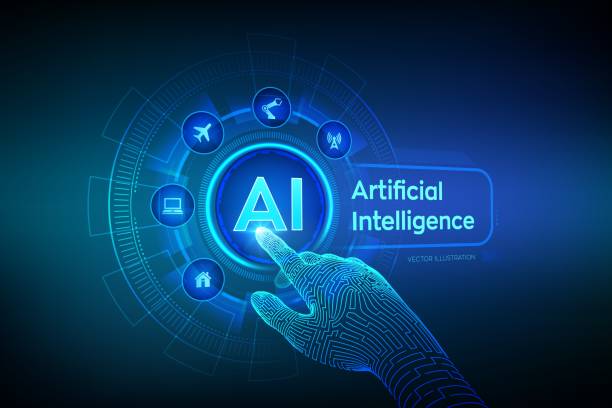What is Artificial Intelligence? Definitions and Basic Concepts

Artificial intelligence (#AI) is a branch of computer science that deals with building machines that can perform tasks that usually require human intelligence.
This broad definition includes learning, reasoning, problem-solving, language understanding, and pattern recognition.
In short, the goal of AI is to simulate human intelligence in machines so that they can perform complex tasks independently.
Artificial intelligence is rapidly advancing, and its applications are expanding in various fields, including medicine, finance, transportation, and education.
Artificial intelligence is not limited to building humanoid robots, but also includes complex algorithms and software systems that are capable of processing data and making intelligent decisions.
In today’s world, artificial intelligence has become one of the most important technologies, and many companies and organizations are investing in this field.
Machine learning, a subset of artificial intelligence, allows machines to learn from data and improve their performance without explicit programming.
Neural networks, inspired by the structure of the human brain, also play an important role in the development of artificial intelligence and are used in many applications such as image recognition and natural language processing.
Artificial intelligence is a multidisciplinary field that includes computer science, mathematics, statistics, psychology, and cognitive science.
Did you know that customers’ first impression of your company is your website? With a powerful corporate website from Rasaweb, multiply the credibility of your business!
✅ Exclusive and eye-catching design tailored to your brand
✅ Improving user experience and increasing customer attraction
⚡ Get free consultation!
History of Artificial Intelligence from Dream to Reality

The history of artificial intelligence (#ArtificialIntelligence) dates back to the 1950s, when scientists such as Alan Turing and John McCarthy proposed the initial ideas of this field.
Turing provided a measure to assess the intelligence of machines by presenting the Turing test.
McCarthy also coined the term “artificial intelligence” and organized a conference in 1956 in Dartmouth, which is known as the official starting point of this field.
In the 1960s and 1970s, researchers tried to build systems that could solve mathematical problems and understand natural language.
Although progress was made, the limitations of technology and the lack of data caused these efforts to face obstacles.
The 1980s witnessed the emergence of expert systems that made intelligent decisions using specialized knowledge in specific fields.
However, these systems also faced problems such as dependence on specialized knowledge and the inability to learn.
In the 1990s and 2000s, with the advancement of technology and the increase in the volume of data, machine learning became one of the most important subsets of artificial intelligence.
Machine learning algorithms, such as deep neural networks, were able to show very good performance in image recognition, natural language processing, and other fields.
Today, artificial intelligence has become one of the most important technologies, and its applications are expanding in various fields.
Among the important milestones in the history of artificial intelligence, we can mention the development of IBM’s Deep Blue system, which in 1997 was able to defeat Garry Kasparov, the world chess champion.
Also, DeepMind’s AlphaGo system in 2016 was able to defeat Lee Sedol, the champion of the Go game, which shows the remarkable progress of artificial intelligence in solving complex problems.
Applications of Artificial Intelligence in Today’s World

The applications of artificial intelligence (#AIApplications) in today’s world are very wide and diverse.
In the field of medicine, artificial intelligence can help in diagnosing diseases, developing drugs, and providing personalized health care.
In the financial industry, artificial intelligence can help in fraud detection, risk management, and providing smart financial services.
In transportation, artificial intelligence can help in the development of self-driving cars, optimizing routes, and reducing traffic.
In education, artificial intelligence can help in providing personalized education, evaluating student performance, and providing feedback to them.
In addition, artificial intelligence has applications in many other fields, including marketing, manufacturing, security, and customer service.
In marketing, artificial intelligence can help analyze customer behavior, provide targeted advertising, and improve customer experience.
In manufacturing, artificial intelligence can help optimize processes, reduce costs, and improve product quality.
In security, artificial intelligence can help detect security threats, prevent cyber attacks, and protect data.
In customer service, artificial intelligence can help answer customer questions, solve their problems, and provide 24-hour support services.
Artificial intelligence is rapidly changing the way we live and work, and it is expected to play a more important role in our lives in the future.
| Field | Application of Artificial Intelligence |
|---|---|
| Medicine | Diagnosis of diseases, drug development |
| Finance | Fraud detection, risk management |
| Transportation | Self-driving cars, route optimization |
| Education | Personalized education, performance evaluation |
Machine Learning and its Role in Artificial Intelligence

Machine learning (#MachineLearning) is one of the main subsets of artificial intelligence that allows machines to learn from data and improve their performance without explicit programming.
In machine learning, instead of being directly programmed, algorithms are trained using data to identify patterns and relationships in the data and use these patterns for prediction or decision-making.
Machine learning is divided into three main categories: supervised learning, unsupervised learning, and reinforcement learning.
In supervised learning, the algorithm is trained using labeled data, which means that each data sample has a label that represents the correct output.
The algorithm tries to build a model that can predict the correct labels for new samples.
In unsupervised learning, the algorithm is trained using unlabeled data and tries to identify hidden patterns and structures in the data.
In reinforcement learning, the algorithm is trained by interacting with an environment and tries to find an optimal policy that can maximize the reward.
Machine learning is used in many applications such as image recognition, natural language processing, fraud detection, and product recommendation.
Machine learning plays a very important role in the development of artificial intelligence and allows machines to perform complex tasks independently.
Are you tired of your online store having visitors but no sales? Rasaweb solves your main problem by designing professional online store sites!
✅ Significant increase in sales with targeted design
✅ Perfect user experience for your customers
⚡ Get free consultation!
Deep Neural Networks Architecture and Applications

Deep neural networks (#DeepNeuralNetworks) are one of the most advanced and powerful machine learning techniques that are inspired by the structure of the human brain.
Deep neural networks are made up of multiple layers of interconnected nodes, each node being an artificial neuron.
Each neuron receives an input, performs a mathematical operation on it, and produces an output.
The output of a neuron is used as input for other neurons in subsequent layers.
Deep neural networks can learn complex patterns and relationships in data and show very good performance in many applications.
Deep neural networks are used in many fields such as image recognition, natural language processing, speech recognition, and computer games.
In image recognition, deep neural networks can recognize images with high accuracy and identify objects in images.
In natural language processing, deep neural networks can understand, translate, and generate text.
In speech recognition, deep neural networks can convert speech into text.
In computer games, deep neural networks can play games with a high level of skill and even defeat human champions.
Deep neural networks are rapidly advancing and are expected to play a more important role in the development of artificial intelligence in the future.
Deep neural networks require a large volume of data and high computing power for training, but the results are very impressive.
Challenges and Limitations of Artificial Intelligence

Artificial intelligence (#AIChallenges), despite its remarkable progress, still faces many challenges and limitations.
One of the most important challenges is the need for a large volume of data to train algorithms.
Machine learning algorithms, especially deep neural networks, need a large volume of labeled data to learn the patterns and relationships in the data.
Collecting and labeling this data can be time-consuming and costly.
Another challenge is the problem of interpretability of algorithms.
Many machine learning algorithms, especially deep neural networks, act as black boxes, which means that it is difficult to understand how an algorithm has reached a particular result.
This problem can be problematic in areas such as medicine and law, where there is a need to explain and justify decision-making.
In addition, artificial intelligence faces problems such as bias, security, and ethics.
Machine learning algorithms can learn and reproduce the biases present in the training data.
These biases can lead to discrimination and inequality.
The security of artificial intelligence is also an important issue.
Machine learning algorithms can be vulnerable to cyber attacks, and attackers can disrupt their performance by manipulating training data or changing the structure of the algorithm.
Ethical issues are also very important in the field of artificial intelligence.
The use of artificial intelligence in areas such as war and surveillance can have serious consequences and requires careful consideration.
Artificial intelligence, despite its many potentials, needs careful attention and consideration so that it can be used responsibly and ethically.
Future of Artificial Intelligence Predictions and Possibilities

The future of artificial intelligence (#AIFuture) is full of exciting predictions and possibilities.
Many experts believe that artificial intelligence will play a more important role in our lives in the future and will create dramatic changes in various fields.
One of the important predictions is the development of artificial general intelligence (AGI), which allows machines to do anything a human can do.
Although AGI is still in the early stages of development, many researchers are trying to achieve it.
The development of AGI can have profound implications for society and lead to fundamental changes in the way we live and work.
In addition to AGI, other advances are predicted in the field of artificial intelligence, including the development of more powerful machine learning algorithms, increasing the volume of data and computing power, and expanding the applications of artificial intelligence in new fields.
Artificial intelligence is expected to play a more important role in areas such as medicine, transportation, manufacturing, education, and customer service in the future.
Artificial intelligence can help solve complex problems, increase productivity, and improve the quality of life.
However, the development of artificial intelligence requires careful attention and consideration so that it can be used responsibly and ethically and to prevent its negative consequences.
| Year | Prediction |
|---|---|
| 2030 | Expansion of self-driving cars |
| 2040 | Emergence of Artificial General Intelligence (AGI) |
| 2050 | Artificial intelligence in all aspects of life |
Impact of Artificial Intelligence on the Labor Market

The impact of artificial intelligence (#AIJobImpact) on the labor market is one of the topics of debate and controversy.
Some experts believe that artificial intelligence will lead to the loss of many jobs, while others believe that artificial intelligence will create new job opportunities.
The fact is that artificial intelligence is both a threat and an opportunity for the labor market.
Artificial intelligence can automate some repetitive jobs and routine tasks and lead to the loss of these jobs.
However, artificial intelligence can also create new job opportunities in areas such as artificial intelligence development, data analysis, and artificial intelligence management.
In order to benefit from the advantages of artificial intelligence in the labor market and prevent its negative consequences, we need proper planning and policy-making.
We must pay attention to the education and training of the workforce and teach them the skills necessary to work in the world of artificial intelligence.
We must also prevent the creation of social and economic inequalities resulting from artificial intelligence and benefit from its benefits fairly.
Artificial intelligence can help improve productivity and increase economic growth, but it requires proper management.
Are you losing your business opportunities because of an old website? With Rasaweb, solve the problem of not attracting potential customers through the website forever!
✅ Attracting more high-quality leads
✅ Increasing brand credibility in the eyes of customers
⚡ Get a free consultation for corporate website design
Artificial Intelligence and Ethics Key Considerations

Artificial intelligence (#AIEthics) faces many ethical issues that require careful attention and consideration.
One of the most important ethical issues is algorithm bias.
Machine learning algorithms can learn and reproduce the biases present in the training data.
These biases can lead to discrimination and inequality.
For example, a facial recognition algorithm trained using training data with low racial diversity may perform worse in recognizing the faces of people of certain races.
Another ethical issue is privacy.
Artificial intelligence requires the collection and processing of a large volume of data, which may include the personal information of individuals.
Protecting the privacy of individuals and preventing the misuse of this information is an important issue.
In addition, artificial intelligence faces issues such as accountability, transparency, and security.
It must be clear who is responsible if an error or damage is caused by an artificial intelligence system.
It should also be ensured that artificial intelligence algorithms operate transparently and that their decisions are explainable and justifiable.
Artificial intelligence requires a strong ethical framework to be used responsibly and ethically and to prevent its negative consequences.
How to Learn Artificial Intelligence Resources and Guidance

Learning artificial intelligence (#AILearning) requires effort and perseverance, but with the use of appropriate resources and guidance, you can make progress in this field.
One of the best ways to start is to participate in online and offline artificial intelligence courses.
Many reputable universities and educational institutions offer courses in the field of artificial intelligence in which you can participate.
In addition to courses, you can also use books, articles, and educational websites.
Many websites and blogs offer useful educational materials in the field of artificial intelligence that you can use.
Learning artificial intelligence is an ongoing process and requires updating knowledge and skills.
By participating in conferences and workshops, you can stay informed of the latest achievements in artificial intelligence and connect with experts in this field.
To learn artificial intelligence, you need knowledge and skills in areas such as mathematics, statistics, computer science, and programming.
If you do not have sufficient knowledge and skills in these areas, you can acquire this knowledge and skills by studying books and participating in training courses.
You can also strengthen your skills in the field of artificial intelligence by doing practical projects.
By doing practical projects, you can apply theoretical concepts in practice and gain valuable experiences.
Frequently Asked Questions
| Question | Answer |
|---|---|
| What is the definition of Artificial Intelligence (AI)? | It is a field in computer science that aims to create intelligent machines that can think, learn, solve problems, and make decisions like humans. |
| Mention some common applications of AI. | These include self-driving cars, voice assistants (such as Siri and Alexa), recommendation systems (such as Netflix and Amazon), facial recognition, and medical diagnosis. |
| What is the difference between Narrow AI (ANI) and Artificial General Intelligence (AGI)? | Narrow AI is specialized in one specific task, while Artificial General Intelligence has human intellectual capacity to perform any cognitive task. |
| What is Machine Learning and its relationship to AI? | Machine Learning is a branch of AI that focuses on developing algorithms that allow systems to learn from data without explicit programming. |
| What are Artificial Neural Networks? | They are computational models inspired by the structure and function of the human brain, used in deep learning to process data and discover complex patterns. |
| Mention some ethical challenges related to AI. | These include privacy issues, bias in data and algorithms, job loss, and responsibility in case of errors or unfair decisions. |
| What is Natural Language Processing (NLP)? | It is a branch of AI that focuses on enabling computers to understand, interpret, and generate human language in a useful and interactive way. |
| How can AI affect the labor market? | It can lead to the automation of some routine tasks, requiring retraining of workers and creating new jobs in the fields of design, development, and maintenance of AI systems. |
| What is Computer Vision? | It is a field in AI that enables computers to “see”, understand, and interpret images and videos in the same way that humans do, enabling them to recognize objects and faces. |
| What is the importance of data in the development of AI systems? | Data is the fuel that feeds AI systems, especially in machine learning. The quality and quantity of data greatly affect the accuracy and performance of the models and their ability to learn and make correct decisions. |
And other advertising services of Rasa Web Advertising Agency
Intelligent Data Analysis: A quick and efficient solution to increase click-through rates with a focus on custom programming.
Intelligent Sales Automation: Professional optimization to increase click-through rates using custom programming.
Intelligent Marketplace: Transform sales growth by helping customize the user experience.
Intelligent UI/UX: An effective tool to increase website visits with the help of marketing automation.
Intelligent Linking: A creative platform for improving customer behavior analysis using real data.
And more than hundreds of other services in the field of internet advertising, advertising consulting and organizational solutions
Internet Advertising | Advertising Strategy | Advertorial
Resources
What is Artificial Intelligence?
,Faradars Artificial Intelligence Training
,




